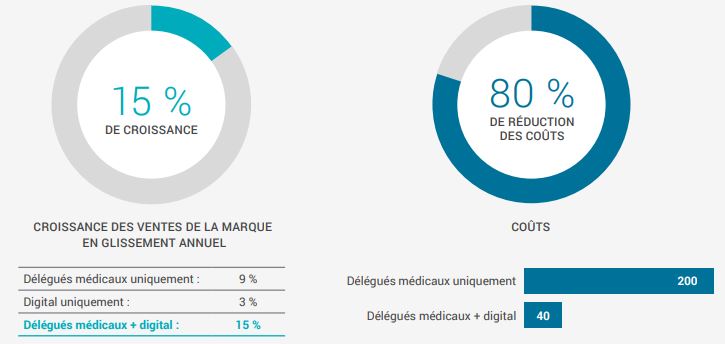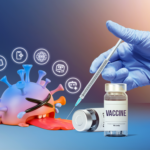Cost Optimization in the Pharma Industry with Digital Solutions
Cost Optimization in the Pharma Industry with Digital Solutions

In an industry where every decision can impact millions of lives, cost control and optimizing pharma costs are crucial issues for the pharmaceutical industry. Yet traditional marketing, often considered ineffective and costly, consumes a significant proportion of budgets without always offering a measurable return on investment.
In this context, adopting digital marketing has emerged as an essential solution. Thanks to innovative tools such as artificial intelligence, e-detailing, and predictive analytics, pharmaceutical companies have found ways not only to cut costs but also to optimize pharma costs and better reach their target audiences. Going digital is more than just modernization: it’s a strategic overhaul that transforms pharma costs and the way medicines are promoted, prescribed, and consumed.
Reduce engagement costs with digital channels
Despite substantial investments in traditional methods, their return on investment (ROI) often remains limited. Companies struggle to precisely measure the impact of each initiative, as traditional tracking tools lack granularity and precision. Moreover, overburdened healthcare professionals (HCPs) may not always retain the information presented, making traditional efforts less productive. However, the adoption of digital channels in the pharmaceutical industry has significantly reduced costs while improving the efficiency of interactions with HCPs.
Digital channels such as Rep Emails, virtual meetings, e-detailing, and online events enable pharmaceutical companies to cut costs associated with in-person visits, including travel and logistical expenses for medical representatives. A study conducted by a major pharmaceutical company in an emerging market revealed that a hybrid approach (digital and physical visits) reduced total costs by 80% while increasing the productivity of medical representatives.

Source : Veeva
Interactions through digital channels are not only more economical but also more effective. Medical representatives using these tools spend an average of 33% more productive time engaging with HCPs. These discussions, often longer and focused on scientific content, maximize the impact of each interaction. For instance, one company reported that digital visits lasted an average of 18 to 20 minutes, compared to shorter durations in traditional visits.
Marketing and Communication Cost Saving: Digital Platforms in Action
In the pharmaceutical industry, communication and marketing constitute significant expenses, often justified by the complexity of validation processes, interactions with HCPs, and the need to comply with strict regulations. However, the rise of digital platforms has revolutionized these activities, providing significant opportunities to optimize costs while enhancing efficiency. Solutions like Veeva CRM and Prez Manager, tailored for the pharma sector, streamline interactions with HCPs and enable real-time monitoring of marketing campaigns.
Veeva CRM has become an industry benchmark thanks to its advanced customer relationship management features. By centralizing HCP data, the platform provides a comprehensive overview that enables precise segmentation and personalized marketing campaigns. Veeva’s integrated analytics tools quickly identify HCP preferences and behaviors, ensuring targeted and impactful messaging.
Prez Manager pushes the boundaries of Closed Loop Marketing (CLM) by introducing an innovative “spatial” approach. This methodology includes 3D visualization tools that transform presentations into immersive, interactive experiences. These features captivate HCPs and simplify the understanding of complex mechanisms, such as a drug’s effects on a pathology while reducing the reliance on physical visits and printed materials.
Boehringer Ingelheim, one of the world’s top 20 pharmaceutical companies, adopted solutions like Veeva CRM Engage Meeting to digitize interactions with HCPs. Within 12 months, the company organized one million remote visits, doubling the average interaction time to 20 minutes. This shift not only boosted team productivity but also significantly reduced logistical costs while reaching a larger number of HCPs.
These innovations signal a new era in managing HCP relationships, positioning digital platforms at the heart of pharmaceutical marketing transformation. By combining centralized data, advanced analytics, and interactive interfaces, these platforms not only reduce costs but also optimize impact and strengthen trust-based relationships with HCPs and patients.
Omnichannel Marketing: Smart Strategies for Pharma Cost Efficiency
Many pharmaceutical companies have adopted omnichannel strategies that combine digital channels such as emails, webinars, and campaigns with targeted interactions by medical representatives. By integrating multiple communication channels into a cohesive and customer-centric approach, omnichannel marketing reduces unnecessary spending, maximizes campaign impact, and enhances the experience for HCPs.
Unlike multichannel approaches, which involve the parallel use of multiple channels without coordination, omnichannel strategies synchronize all touchpoints to deliver a seamless, personalized experience. This approach eliminates redundant campaigns across various channels, cuts unnecessary expenses by targeting only relevant segments, and improves interaction efficiency. Modern analytical tools, such as those offered by Veeva CRM or IQVIA Omnichannel Engagement, provide real-time insights to adjust campaigns and maximize ROI.
Frédérique Methel, Project Manager for CRM & BI at Shift, highlights that the value of omnichannel campaigns lies in increased engagement, better customer understanding, and content adaptation based on areas of interest. She also notes that pharmaceutical companies aim to demonstrate the relevance of these tools in terms of real-world performance and ROI.
AI and Predictive Analytics: Large-Scale Savings
Artificial intelligence (AI) and predictive analytics are revolutionizing the pharmaceutical industry, offering unprecedented opportunities to optimize costs while improving process efficiency. From clinical research to marketing campaign management, these technologies transform practices, enabling substantial savings and better ROI.
-
Optimizing Clinical Trials: Reducing R&D Costs
Clinical trials account for up to 60% of total R&D expenses in the pharmaceutical industry. AI and predictive analytics rapidly identify the most suitable patients, reducing recruitment times and logistical costs. These tools also anticipate risks, enhancing the safety and efficiency of studies.
Studies indicate that the strategic use of digital technologies can bring significant improvements in clinical trial management. For instance, an analysis by Globant suggests that adopting data- and patient-centric strategies, as well as deploying digital solutions, can improve trial timelines and reduce spending in key areas such as protocol design, patient recruitment, and data management.
According to a report by Accenture, leveraging advanced data and digital technologies can accelerate new treatment development and lower overall R&D costs. Integrating data-driven strategies has notably improved protocol design, site selection, and data management.
-
Predictive Maintenance : Preventing Unnecessary Pharma Costs
Pharmaceutical production lines require costly, regular maintenance to avoid unexpected breakdowns. Predictive maintenance, powered by AI, analyzes sensor data to forecast potential failures and schedule repairs at optimal times.
Implementing predictive maintenance in the pharmaceutical industry has proven significant benefits. For instance, this proactive approach minimizes unplanned downtime and extends the lifespan of critical equipment, optimizing resource use and reducing lifecycle costs.
-
Optimizing Marketing Campaigns: ROI and Efficiency
The analytical capabilities of predictive AI are also transforming pharmaceutical marketing. By enabling precise audience segmentation, campaigns can be adjusted in real time to align with HCP behaviors. These technologies identify the most effective channels and anticipate audience responses, focusing resources on initiatives with the highest ROI.
Platforms like Veeva provide advanced tools for real-time ROI analysis, allowing budgets to be reallocated effectively and preventing resource waste.
Cost optimization in the pharmaceutical industry through digital solutions is no longer optional—it is a strategic necessity in an increasingly competitive and regulated environment. Tools like AI, e-detailing, advanced CRM platforms, and predictive analytics pave the way for profound transformation, balancing budget control with improved performance.
As digital tools continue to redefine industry standards, companies that proactively adopt these technologies not only reduce costs but also unlock new opportunities to enhance competitiveness, expand their impact, and, ultimately, improve public health. The future of the pharmaceutical industry is digital, and it begins now.


